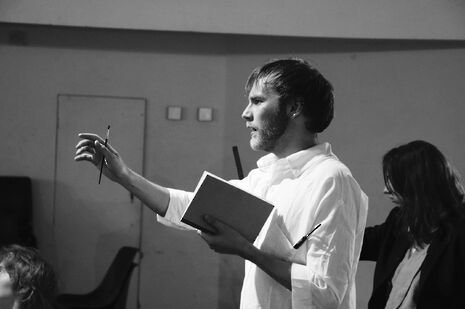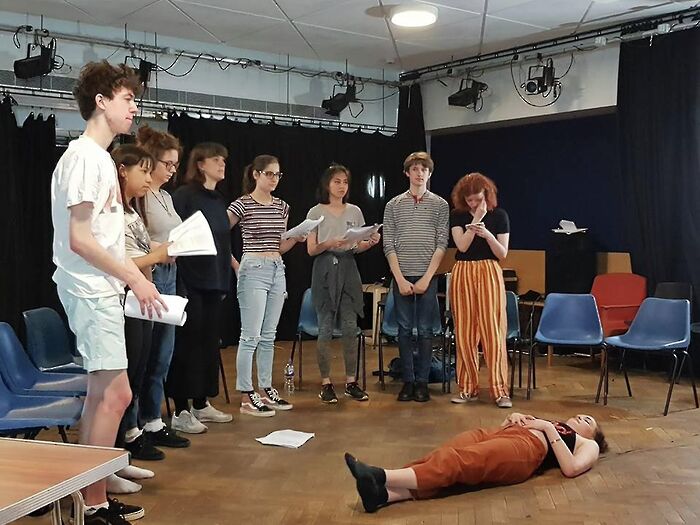Master-Stroke preview: ‘an intelligent piece of new writing not to be missed’
Chronicling the story of Victorian ‘novelty artist’ Richard Dadd, Victor Rees’ new play is one to watch

Amongst a litter of disordered papers, a figure sits hunched on the ground under the shadow of a lone easel. He tears up one of these papers and skewers the pieces onto wires protruding from a flower pot, forming a tortured-looking white rose. At one point, he bursts into a coughing fit and reaches instinctually for the glass of water placed on top of his easel, in which two paintbrushes are still soaking. These are striking stage pictures, and fitting ones with which to open Writer and Director Victor Rees’ latest project, Master-Stroke.
Master-Stroke explores the life of Victorian "novelty artist" Richard Dadd. Born in 1817, Dadd showed early signs of a talent for painting, and grew to considerable popularity as the Victorian fixation on fairies, his favourite subject, grew more pronounced. His most celebrated piece, The Fairy Feller’s Master-Stroke, is a captivating oil painting completed over the course of nine years (though Dadd himself considered it unfinished). Depicting an alluring yet somehow almost sinister fairy scene in overblown primary colours, this is the painting from which Rees’ play takes its name which centres on his time at Bedlam. It was in this notorious psychiatric hospital that Dadd created his extraordinary painting, painting as a kind of therapy after he was imprisoned for the murder of his father in 1843.
This is certainly a case in which the fact is stranger than the fiction
But this is only the tip of the iceberg, and the more I learn about Dadd in conversation with Rees, the more fascinated I am by his story. While spending time in Egypt, Dadd underwent a profound mental change, initially believed to have been brought on by sunstroke. As Rees recounts, Dadd began to believe he was in contact with the god Osiris, who commanded him to kill all men possessed by the Devil; a list he believed to include, among others, his own father, family friends, and the pope. Rees explains that in some respects, the most challenging part of adapting Dadd’s story for the stage was dialling back or omitting some of its more outlandish details. This is certainly a case in which the fact is stranger than the fiction, as Rees makes it clear that he didn’t want some of the more scandalous aspects of Dadd’s biography to distract from the emotional core of the play.

He is not interested in creating a purely factual piece, he explains, and cites Peter Shaffer’s Amadeus as a play which skilfully plays with historical details to create a sweeping tragedy. And while Rees’ down-to-earth approach means that he is quick to stresse that he doesn’t wish to compare himself to industry veterans like Shaffer, I do notice a similar elegance and lightness of touch in the writing.
It is promising to see the cast also have a genuine enthusiasm for the writing. One cast member describes the task of working on such an "intimate study" with excitement, while Lewis Owen, tackling the role of Dadd himself, discusses how rewarding yet challenging he has found the task of forcing himself into the mindset of someone who simply does not possess a "normal" mindset. He and Rees suggest that part of what makes Dadd’s story so compelling is that it coincides with a period of rapid development in the field of psychiatry. In this way Dadd’s time at Bedlam makes for a fascinating case study from a cultural moment in which the model of insanity was evolving, transitioning from viewing individuals like Dadd as animals that must be coerced into docility, into seeing them as damaged, complex human beings.
The strength of the characterisation, in Owen’s view, comes from the fact that this a piece ostensibly without a villain; the characters are each doing their utmost to better the situation in which they find themselves, but just can’t seem to agree on how to effect change. This kind of compassion for his characters, combined with poised dialogue which makes exposition seem effortless and an effective, minimalist staging, promises that Rees’ production is an intelligent piece of new writing not to be missed.
Master-Stroke will be on at the Fitzpatrick Hall from 23-24 May
 News / Clare Hall spent over £500k opposing busway 24 December 2025
News / Clare Hall spent over £500k opposing busway 24 December 2025 Comment / The ‘class’ of Cambridge24 December 2025
Comment / The ‘class’ of Cambridge24 December 2025 News / Caius mourns its tree-mendous loss23 December 2025
News / Caius mourns its tree-mendous loss23 December 2025 Comment / League tables do more harm than good26 December 2025
Comment / League tables do more harm than good26 December 2025 News / Girton JCR publishes open letter expressing solidarity with Palestine25 December 2025
News / Girton JCR publishes open letter expressing solidarity with Palestine25 December 2025









